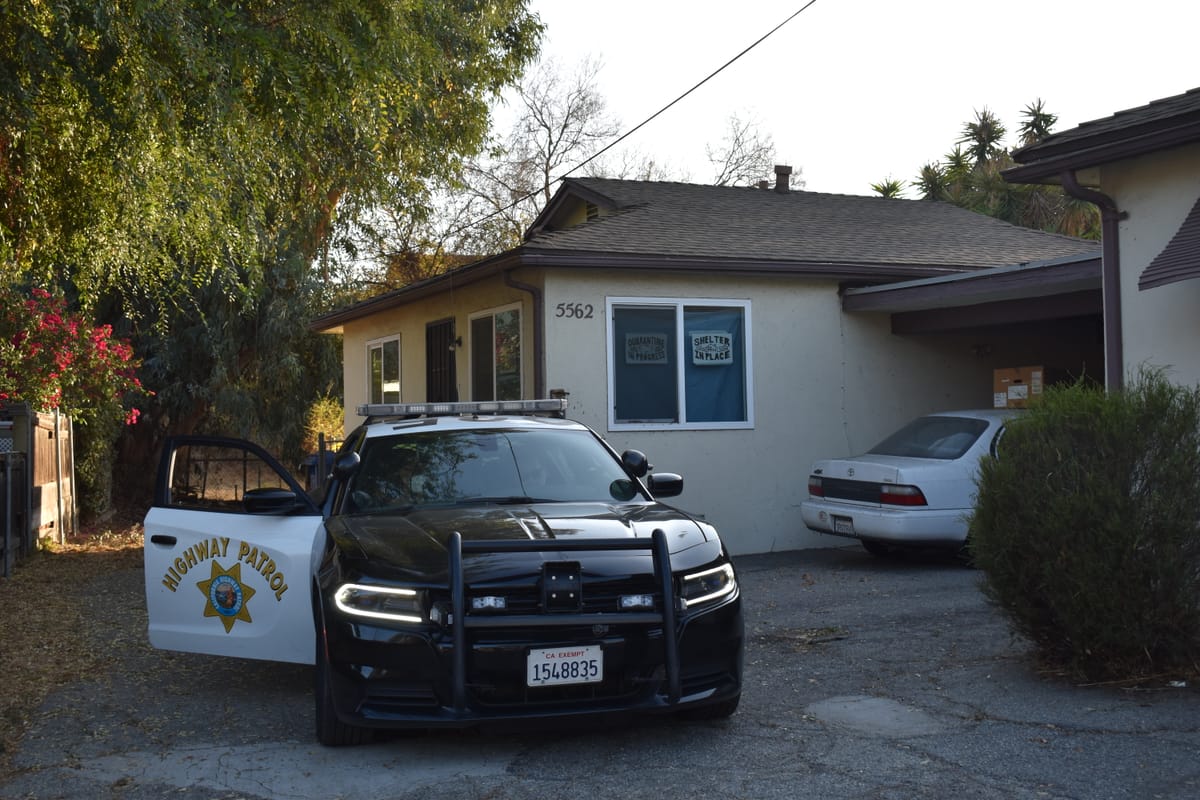
One 17-year-old girl was ecstatic to have her own room for the first time in her life. Hours later, she was hogtied by the CHP.
In the early morning hours of Thanksgiving Day, California Highway Patrol officers outfitted with helmets, body armor, and assault rifles used battering rams to break down the doors of vacant CalTrans-owned homes in El Sereno where housing-insecure people had been sheltering in place from the COVID-19 pandemic.
The forcible removal was part of an operation that began Wednesday night and continued into the weekend. Law enforcement officers arrested more than 60 people tied to an effort to move families into houses that have sat empty for half a century. CHP spokesperson Sarah Richards said Sunday that 21 of the arrestees were inside the homes. They were cited for violations of 602 (m) PC, or a misdemeanor trespass, and 459 PC, or burglary. Richards said the Los Angeles District Attorney’s office will determine whether the burglary citation will result in a charge of First Degree Residential Burglary (a strike offense) or 459 Second Degree Burglary (a non-strike offense).
Seventeen year old B. moved into one of the properties earlier this month with her mother. Activists with Reclaim and Rebuild Our Community said that the house had been empty since the 1970s. The inside of the home was dark and heavy with the dust of the past several decades, and utilities have been shut off just as long. B. had spent most of her time in the home cleaning up with a makeshift broom constructed out of cardboard. She and her mother, Sonia, shared food donated by activists. In the hours leading up to Thanksgiving, B. gushed about having her own room for the first time in her life. Hours later, she was dragged out of the home in hogties by CHP.
Claudia Lara, a representative of RROC, begged California Governor Gavin Newsom to have law enforcement stand down just minutes before they began their operation on Wednesday night.
“Our communities have a long history of police brutality and of police murders at the hands of the police. And honestly, these families are scared,” she said. “We are asking the governor to intervene, to ask for each and all law enforcement to not use any violence to allow us to shelter in place… it doesn’t make any sense that there’s these empty homes.”
CalTrans purchased 460 properties between the 1950s, ’60s, and ’70s to make way for a plan to extend the 710 freeway that has since been abandoned. The agency has started to make some homes available to current tenants at affordable prices or to non-tenants at market value as required by state law. However, only a few have sold. An investigation by the Pasadena-Star News found that 163 in the El Sereno area are vacant, even as California faces a housing crisis.

CalTrans spokesman Matt Rocco said Friday that the homes that had been occupied have since been boarded up again. He referred to a statement from Wednesday that said the vacant homes “that were broken into are unsafe and uninhabitable for occupants.” The statement also said that “Caltrans requested the CHP remove trespassers so that the properties can be re-secured and boarded up.”
In March, another group of families drew national attention when they moved into 13 similarly deserted CalTrans properties. In October, the families struck a deal to move into the homes legally. After months of negotiation with activists and government officials, the state entered into a lease with the Housing Authority of the City of Los Angeles. Twenty-two of the vacant homes will be used as transitional housing for all of the original “reclaimers.”
Movements to occupy empty homes have gained momentum in recent years. In 2019, a group of unhoused mothers in Oakland moved in to a property that had been purchased by Wedgewood Inc., a real estate investment firm. They were also evicted, but were able to secure the home’s sale to a land trust.
Newly elected Los Angeles City Councilmember Kevin De Leon said in a statement on Thursday that he was reaching out to the governor “to highlight the need to restore these remaining properties and move quickly on legislation that would give the city more authority over these properties.” The reclaimers have something different in mind.
“Transitional housing is not what we’re asking for and it’s not what we need,” Lara says. “Transitional housing is temporary, and we are looking for these homes to become permanent homes to these families.”
In an open letter to Governor Newsom, LA City Councilmember Kevin de León, Senator María Elena Durazo, US Representative Jimmy Gomez, and Assemblymember Wendy Carrillo, the group makes several demands. Among these, the RROC wants all of the families allowed back into the houses, and the properties sold to the El Sereno Community Land Trust. The organization formed about two years ago to help residents buy a piece of commercial property. It’s since been turned into a community center called Eastside Cafe. RROC is also asking all charges be dropped for people who were arrested, and that their possessions be returned.
Time will tell if state authorities will work with the reclaimers to see these houses used for shelter again, or leave them empty in the midst of a deadly pandemic.
Donations to B. and Sonia can be made via Cash App to $indyReclaimersLA.
